A TikTok video of a 'ghost mall' in Malaysia went viral this summer. I spent a day there and found the area's problems run even deeper.
Marielle Descalsota

- Cyberjaya has been dubbed Malaysia's Silicon Valley, but without much to show for it.
- A mall in the city went viral on TikTok for being a deserted "ghost mall."
Malaysia's Malakat Mall holds the dubious claim to fame of having gone viral on TikTok as a "ghost mall."
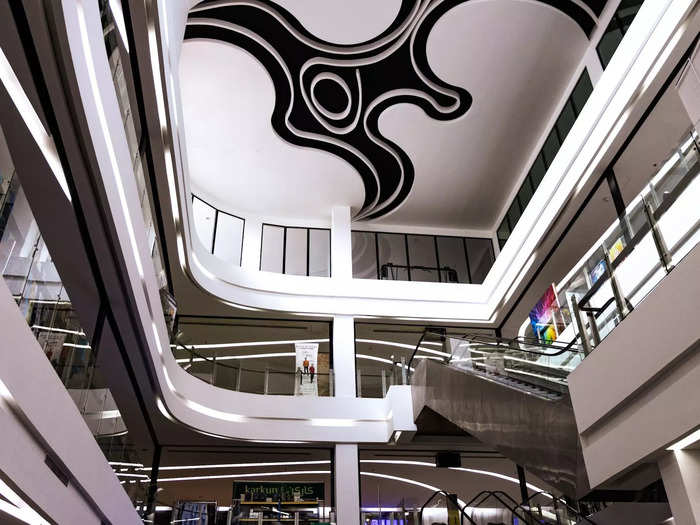
Malakat Mall is located in Cyberjaya, a city 30 minutes outside the capital city of Kuala Lumpur.
In August, a 24-year-old content creator named Aqlan Rosli shared a video online in which he walked through a modern-looking mall full of well-stocked shops and a food court — without bumping into anyone at all.
"There are so many shops that are beautiful," Aqlan says in Malay in the video. "They are renovated and it seems like thousands upon thousands of ringgit was spent only to have no visitors."
Aqlan's video garnered over 2,000 comments, many of which were from locals who said the mall was so empty because the shops were "too expensive," while others said there wasn't a good enough reason to visit.
Local media went on to dub Malakat Mall an "abandoned ghost mall."
In late November, I traveled from Singapore to Cyberjaya to check out the mall myself. Was it really as empty as Aqlan's video made it seem, I wondered, or did he just catch it on a bad day?
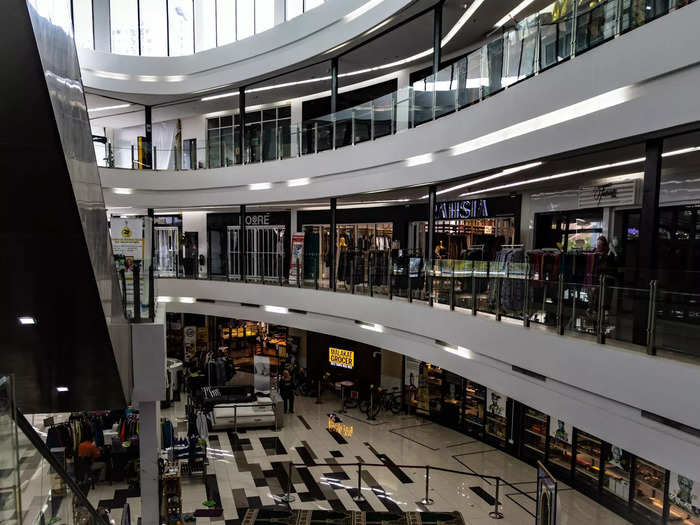
I met up with Aqlan in Cyberjaya, where he lives. Aqlan, who describes himself as an entrepreneur, told me he made the video as he felt "pitiful" of the people at the mall.
"My wife told me that we could make a TikTok about the mall to help them, but I didn't think it would go viral," Aqlan told me.
"I know how sad it is to open up a business and have no customers and no traffic," Aqlan said. "After the video went viral, more people began visiting Malakat Mall again, but after a month it went back to how it was before," he added.
I arrived at the mall on a weekday afternoon, expecting it to be deserted.
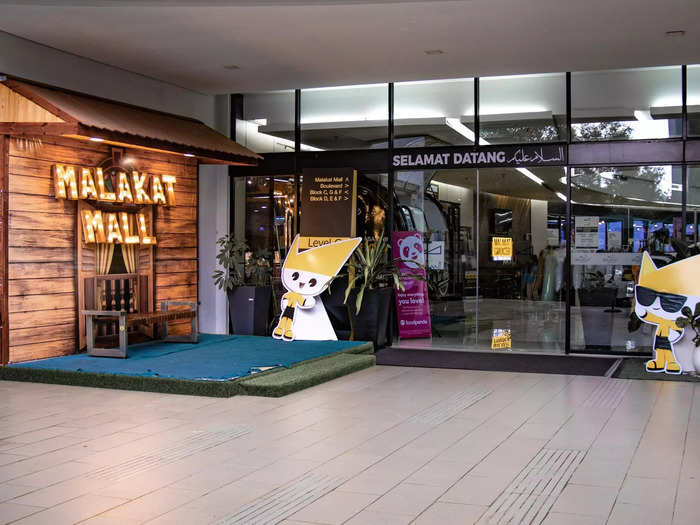
The mall was bigger than I expected, with three floors of shops selling everything from local clothing to children's books. There were around 48 lots in the mall, but less than half were occupied.
The interior was gorgeous as far as malls go, with natural light streaming into the pristine, white corridors. But it had the atmosphere of a library: Aside from the occasional sound of the Islamic call to prayer resounding through the mall, it was quiet. Some staffers chatted quietly as they stacked more products onto full shelves.
I didn't see anyone shopping in the boutiques. Most of the people I saw at the mall were the ones quietly manning shops.
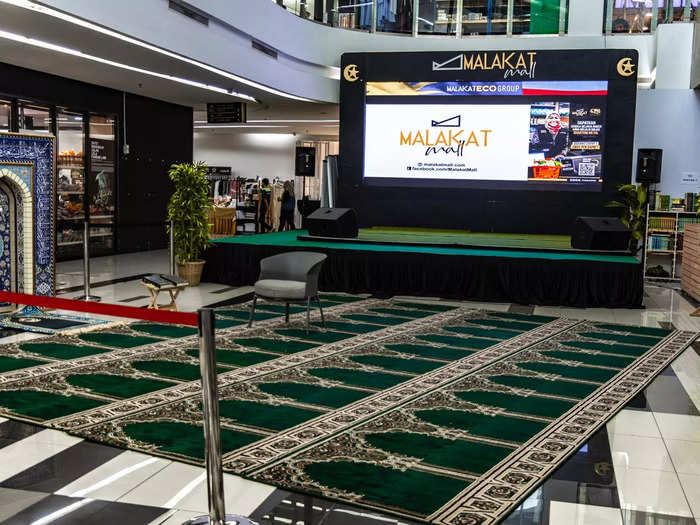
The mall's grocery store was the only exception: I spotted a handful of people buying produce at the store, which was stocked with products imported from Turkey.
I asked several residents why they thought very few people visited Malakat Mall. One local, who declined to be named, said that it's too close to D'Pulze, the only fully operational mall in the city, which was only a five-minute drive away.
The liveliest place in the whole mall was Te Amo Cafe.
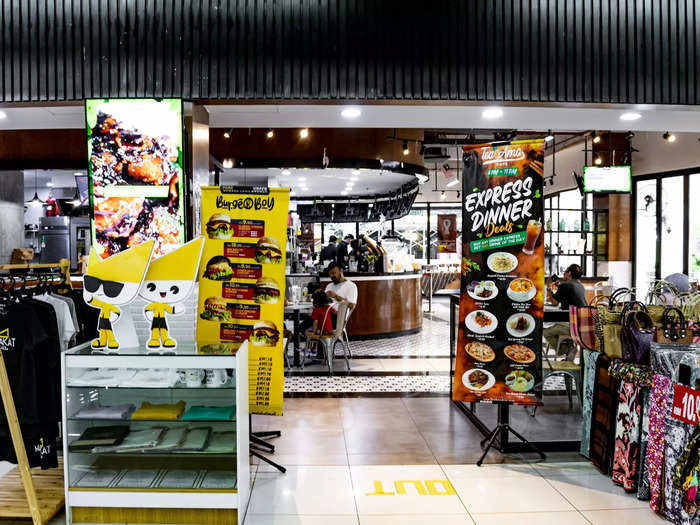
The restaurant, which was one of more than 20 businesses at the mall, sold local food and beverages like mee goreng, or stir-fried noodles, and teh tarik, or milk tea.
I met the owner of the mall, a local businessman named Fadzil Hashim, at the restaurant.
Fadzil owns several enterprises in Malaysia, including an Islamic international school. He told me the mall opened in March 2020 to much fanfare.
"At that time only nine shops were open, but we had more than 6,000 people come visit," Fadzil said, adding that he hired almost 500 staff.
"I said, okay, we are ready."
But four days after the mall's opening, Malaysia went into a months-long pandemic lockdown. The mall has struggled to get back on track ever since.
"We took over a dead mall that was built seven years ago and was vacant ever since. We tried to revive it," Fadzil said, adding that he and his partners have spent over 40 million Malaysian ringgit, or around $9 million, developing the mall without any loans.
Two years after the mall first opened, Fadzil said it still isn't breaking even. He said the mall had a revenue of 17 million ringgit and 25 million ringgit in its first two years of operation, but because of the mall's size, "it still isn't enough."
I spoke to one man who owns an art boutique in the mall. The colorful shop struck a contrast with the sleek, minimalist interior of the mall.
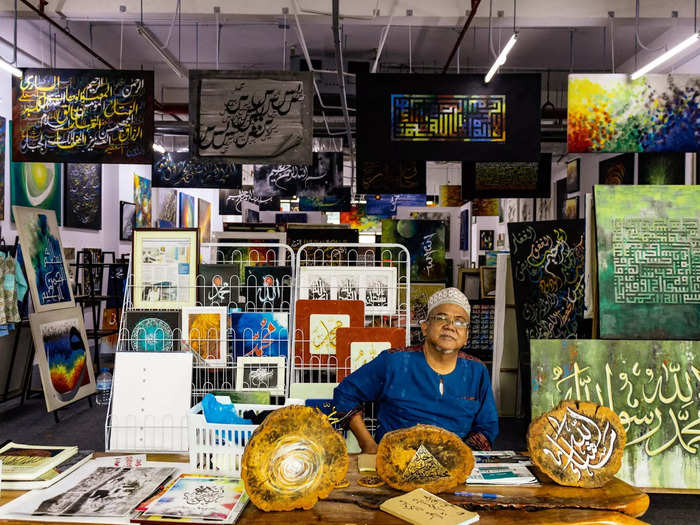
Abdul Ghafur, a professional architect and artist who specializes in Islamic art, has been selling paintings at the mall since it opened. Abdul's paintings sell for up to 45,000 Malaysian ringgit, but he said business has been "very, very bad," and it's been "tough to survive."
Abdul said there are often "no customers from morning till night," and that it's difficult to sell paintings in Cyberjaya, especially expensive ones.
Even so, Abdul said he has no plans to leave Malakat Mall.
"It's the only Malay-Muslim concept mall in Malaysia," Abdul said, adding that he feels attached to the mall as "there is a brotherhood here."
While the mall didn't have many customers, I was struck by the lively camaraderie among the staffers working there.
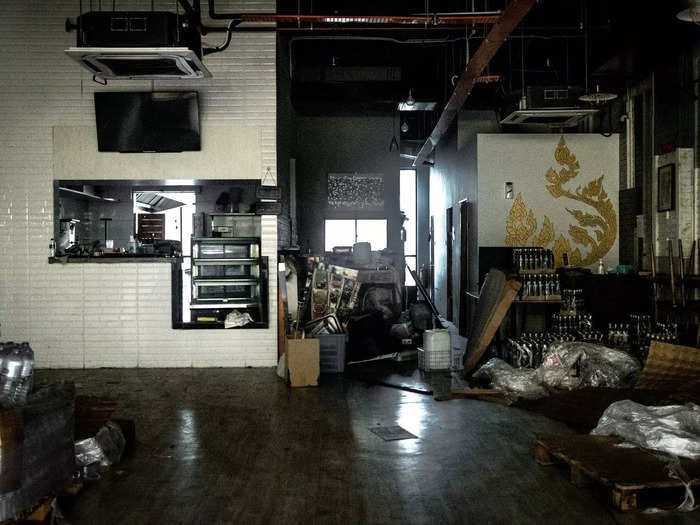
Outside the mall, I found a singer performing for a small crowd. A couple meters away stood a unit where a popular Thai restaurant once operated. While it's listed as operating on Google Reviews, one of Fadzil's staff told me it has "closed down for good."
The restaurant appeared to once have good reviews online, with diners describing the food as "affordable" and "delicious."
The lot was padlocked and the tinted glass walls obscured what was inside, but my fat zoom lens captured an eerie image of the restaurant's interior. Kitchen tools were piled in a corner and dozens of bottles of beverages stood packaged together, unused. It looked like a scene that had been quickly and hastily abandoned.
The mall is located in an area called CBD Perdana 3.
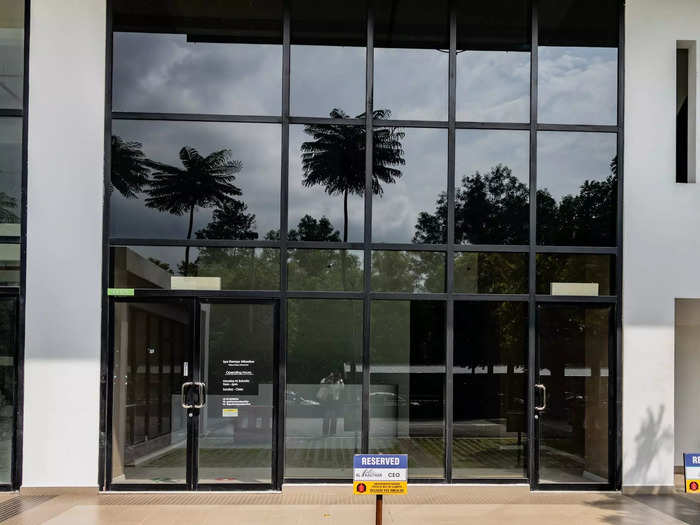
CBD Perdana was developed by Cyberjaya-based real-estate firm Setia Haruman. The area was developed in 2006, according to Land Plus, a local property website.
The space was envisioned to become a central business district with offices and retailers. But, some 16 years later, I found it to be almost completely abandoned.
In fact, by contrast, it made the mall look like a busy market. Several business, including spas and clinics, once operated in these lots, according to the operating details I found tacked onto the glass doors.
Several other malls in the city, including the once-hyped Gem in Mall, have also been described as deserted by residents.
The vacant lots were reminiscent of the rows of abandoned stores I saw earlier this year in Forest City, a luxury ghost town in Johor Bahru.
Setia Haruman did not respond to my requests for comment.
The deeper I went into CBD Perdana 3, the more I realized how deeply in trouble businesses in the area were.
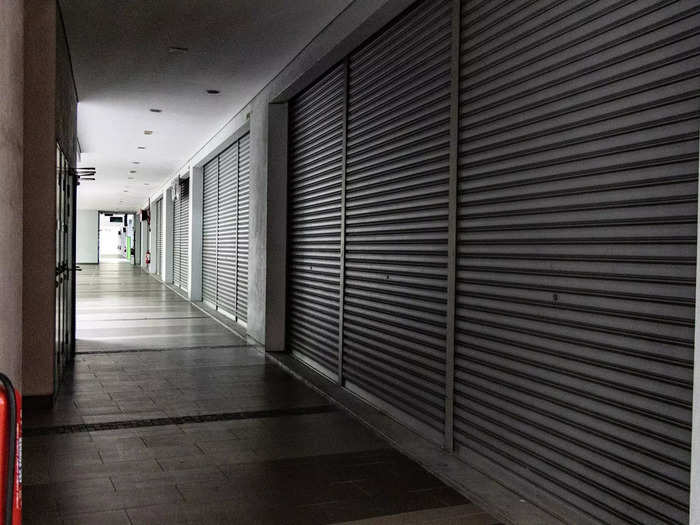
In the space adjacent to Malakat Mall, which was about the size of 14 football fields, rows and rows of stores were shuttered.
According to Setia Haruman, the space measures 13.8 acres.
I walked the entire first floor of the vicinity, and found only one business in operation: a kindergarten.
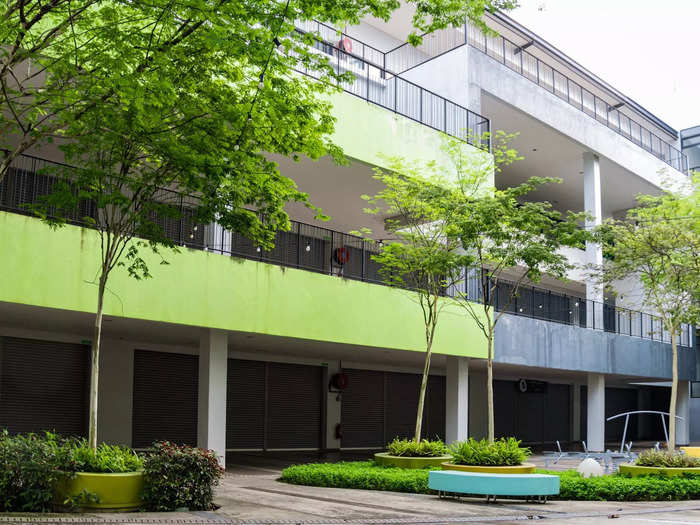
When I asked a staff member, who declined to be named, if there were other shops in operation, she said that "it's always been like this."
There was a sense of newness to the empty buildings, as if they had never been in use.
Just opposite these shuttered lots were tall glass walls that showed how deserted the entire space was.
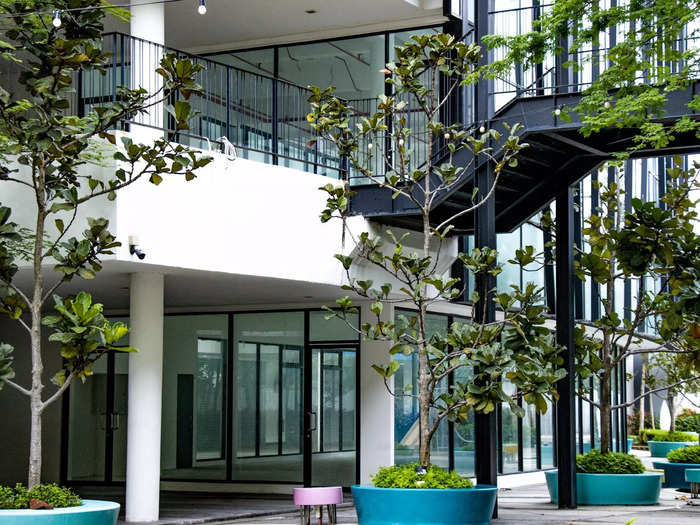
The buildings were well maintained, with the plants and bonsai-style trees in perfect condition.
Malakat Mall isn't the only "ghost mall" in Cyberjaya, a city once touted as the Silicon Valley of Malaysia.
Several residents told me the city is home to a handful of dead malls, and it only has one fully operational mall. The reason the local mall scene is dead might have something to do with the location.
Cyberjaya was developed in 1997 as the brainchild of the former two-time prime minister Mahathir Mohamad, who wanted to build a "multimedia economy." The city garnered a reputation as the country's Silicon Valley.
Noor Azman Yusof, who was the corporate finance manager of Cyberjaya's initial development team, estimated that it cost $700 million at the time to build the infrastructure of the 2,800-hectare city.
"It was the beginning of the dot-com bubble, and the benchmark was Silicon Valley," Azman told me. Azman held various roles in Cyberjaya's construction, including leading the development of the city's fiber optic network.
Cyberjaya has been described as a "failure" by media outlets and think tanks alike. And, some two decades after the city was launched, it doesn't have much to show for it.
Today, Cyberjaya, with its more than 100,000 residents, is devoid of the unicorn startups and big tech offices that are commonly associated with Silicon Valley. Instead, it's a residential city where rent is affordable and residents enjoy low cost living, coexisting alongside pockets of space that's almost completely deserted.
As CBD Perdana 3's name implies, it's one of three similar areas. When I checked out CBD Perdana 2, I found that it, too, was full of vacant spaces.
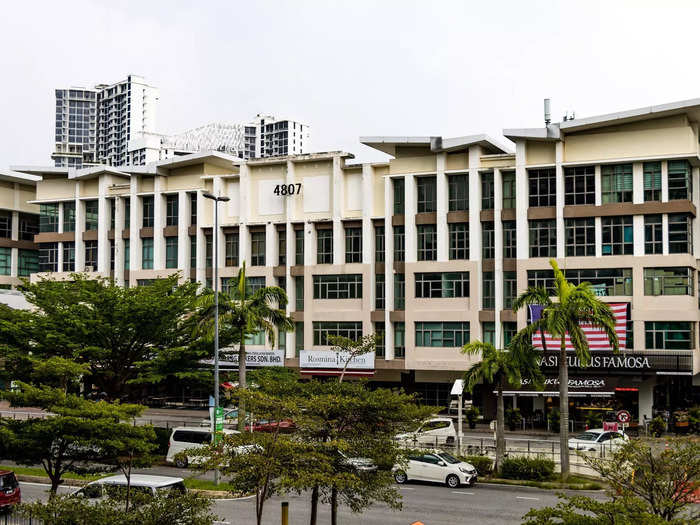
In all, there are three areas developed as part of CBD Perdana.
The further I explored the vicinity, the more of a ghost town it became. Building after building was covered in tarpauling advertising the space was available for sale or for rent.
CBD Perdana was massive, yet there were barely any businesses and people. While Malakat Mall wasn't exactly bustling, everything around it was outright desolate by comparison.
Even after walking in the area around for several hours, I only a handful of people, most of whom were locals packing food from the few family-owned restaurants that were open.
I spoke to one local resident, who declined to be named, about what he thought about the deserted spaces around him.
"Oh, I never really took notice," he said. "It always seemed to be this way and it doesn't bother anyone."
Popular Right Now
Popular Keywords
Advertisement